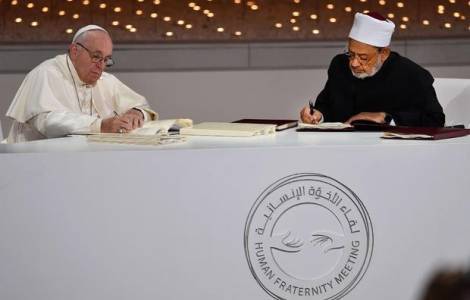
by Gianni Valente
Rome (Agenzia Fides) - On February 4, 2019, when the Bishop of Rome and the Grand Imam of Al Azhar signed the Document on Human Fraternity for World Peace and Living Together in Abu Dhabi, their unexpected gesture surprised many. Even the specialist press took some time to fully understand the document and report on it adequately.
Five years later, in a time marked by wars and attacked by those who want to "accelerate the Apocalypse", the Abu Dhabi Document increasingly reveals its full prophetic significance. Bishop Paolo Martinelli, Apostolic Vicar of Southern Arabia also points this out in a letter reported by Fides.
Five years ago, when a climate of “jihadism” spread fear and terror in the Middle East and throughout the world, attention, including that of the media, especially in Western circles, was focused on passages of the text which put solid barriers against any impulse to transform words and religious references into fuel to foment "feelings of hatred, hostility, extremism", by disfiguring the name of God.
In fact, Pope Francis and Sheikh Ahmed al Tayyeb call into question "the political use of religions" and also the "interpretations of groups of religious leaders" who have abused religious sentiments to lead people to do something "that has nothing to do with the truth of religion". The document reiterates that "God, the Almighty, does not need to be defended by anyone and does not want his name to be used to terrorize people". It goes on to say that God "created all human beings equal in rights, duties and dignity"; he gave them freedom, "by creating them free", and therefore "everyone enjoys the freedom of belief, thought, expression and action".
But the document was not and is not just a warning with "instructions" to curb the aberrations that disfigure religious meaning. In the text, the Pope and the Imam testify that the rediscovery of the brotherhood of the children of God is also a "reserve" of critical thinking in the face of the individualistic tendencies, cultural neo-colonization and dehumanization processes that flood the age of globalization.
In the jointly signed text, Pope Francis and Imam al Tayyeb also affirm that injustice and the unequal distribution of natural resources "have produced and continue to produce enormous numbers of the sick, needy and dead and cause deadly crises"; that the family, as the fundamental core of society and humanity, is "indispensable to give birth to children, raise them, educate children and provide them with sound morals"; that life is a gift from the Creator and "that no one has the right to take away, threaten or manipulate at will", and must be protected "from its beginning until its natural death", also combating "abortion and euthanasia and the policies that support all this". The Pope and the Imam, not only curb the delusions with which religious words are misused, but also recognize that the processes of dehumanization that are underway involve "a numbed human conscience and an alienation from religious values, as well as the dominance of individualism and materialistic philosophies that deify man". The Abu Dhabi Document's prophecy of brotherhood draws strength and intensity from sources that precede it. And Pope Francis' intuition follows the great tradition of the Church, which had already recognized at the Second Vatican Council in the declaration "Nostra Aetate" that "we cannot truly call on God, the Father of all, if we refuse to treat in a brotherly way any man, created as he is in the image of God".
In the same Nostra Aetate Declaration, the Second Vatican Council affirmed that the Church honors and regards with respect Muslims who "strive to submit with all their soul to the decrees of God" and "await the Day of Judgment when God will reward all resurrected men".
In Damascus, one of the three minarets of the huge Umayyad Mosque is known as the Minaret of Jesus. According to a tradition kept by the Muslims in Damascus, Jesus will appear on this very tower on the day of his return to defeat the Antichrist, announce the end of time and separate the good from the evil. In the face of wars that massacre entire peoples and in the face of heralds of terror who, from different sides, agree in wanting to "hasten the Apocalypse", even the prophecy of Abu Dhabi suggests that the path of the Church from the Council to today in its relationships with the religious communities is not a spiritualistic sentimentality, but has something to do with all of this in a mysterious way. It has to do with what the theologian Dietrich Bonhoeffer had suspected in the face of the Nazi delirium: "There is a kind of unconscious distinction," wrote the great Lutheran theologian, "which, in the hour of extreme danger, leads those who do not want to fall under the blows of the Antichrist to seek refuge in Christ". (Agenzia Fides, 4/2/2024)